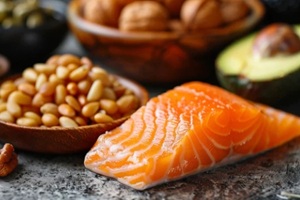 Healthy breast tissue is essential for reducing the risk of cancerous development. While genes play some role in breast cancer risk (as does the frequency of preventive care, such as mammograms), lifestyle choices also have a significant impact.
Healthy breast tissue is essential for reducing the risk of cancerous development. While genes play some role in breast cancer risk (as does the frequency of preventive care, such as mammograms), lifestyle choices also have a significant impact.
Exercise, nutrition, and sufficient vitamin intake are all important steps in lowering the risk of breast cancer. However, it can be unclear which foods are beneficial and which may increase risk instead of decreasing it.
While every diet should contain various foods, specific categories or types are especially valuable in reducing cancer risk. Bear in mind, whenever possible, food should be consumed as close to its origin as possible; for example, whole foods such as fruits are preferable over artificially sweetened fruit juices.
It is helpful to get a baseline knowledge of food groups so you can make smart choices about nutrition.
Cruciferous Vegetables
Vegetables, in general, are a good inclusion in any diet, but cruciferous vegetables are incredibly impactful. “Cruciferous” means vegetables in the same family as cabbage; think broccoli, bok choy, cauliflower, Brussels sprouts, turnips, and radishes.
These vegetables contain valuable nutrients, such as carotenoids, glucosinolates, indoles, and isothiocyanates. These compounds (especially indoles and isothiocyanates) correlate with a decreased risk of breast cancer because they actively inactivate carcinogenic compounds, protect DNA strands from damage, and reduce inflammation in the body.
Other Vegetables and Fruits
It is hard to go wrong with any vegetable or fruit incorporated into the diet. The substances in fruits, such as antioxidants, decrease cell damage and boost the immune system to combat any problematic cells it encounters.
Studies indicate that various types of cancer are affected by fruit. Fruit (especially dried dates and figs) are correlated with a risk decrease ranging from just a few percentage points to more than 60% relative risk.
“Fatty” Foods
 Most people know that fat is not the best inclusion in anyone’s diet. Still, fewer are aware that not all fat has a problematic effect. While saturated and unsaturated fats (and especially trans fats) in excess may be troublesome for heart health and other health indicators, fats called omega-3 fatty acids can actually slow cancerous cell division and decrease inflammation.
Most people know that fat is not the best inclusion in anyone’s diet. Still, fewer are aware that not all fat has a problematic effect. While saturated and unsaturated fats (and especially trans fats) in excess may be troublesome for heart health and other health indicators, fats called omega-3 fatty acids can actually slow cancerous cell division and decrease inflammation.
Omega-3 fatty acids can be found in salmon, chia seeds, walnuts, and soybeans; generally, any nut or seed will be a good source of omega-3s.
Whole Grains
Carbohydrates serve as quick fuel for the body; in today’s modern world, it is effortless to find them. However, some carbohydrates offer more benefits than others. Whole grains, which include more parts of the grain than refined products, offer fiber, vitamins, and minerals that can be hard to find from other sources.
Fiber, especially, is important as a mitigating agent against breast cancer. It keeps the gut microbiome healthy, impacting metabolism and overall health. It also keeps people feeling full longer, serving as a powerful force in weight control (and thus breast cancer control, as excess weight leads to increased estrogen production). In some studies, consumption of fiber held a significant inverse correlation with breast cancer development.
Hydration
When people think of nutrition, they tend to think of food. However, water is just as important! Good hydration can reduce the risk of breast cancer in a roundabout way: through the colon. Higher water consumption prevents constipation, which allows bodily waste (including free estrogen) to exit the body.
Without sufficient water intake, the gut moves this waste more slowly, allowing the excess estrogen to remain in the body longer. As a result, estrogen levels can become unbalanced, causing breast tissue proliferation that boosts the chances of cancer development.
Alcohol Intake
 Alcohol is a regular part of many people’s lives. From an occasional drink at a work happy hour to a regular daily habit, consumption of alcohol can find its way into a person’s life in many ways. However, studies consistently show that alcohol consumption is correlated with a 30% to 50% increase in breast cancer risk.
Alcohol is a regular part of many people’s lives. From an occasional drink at a work happy hour to a regular daily habit, consumption of alcohol can find its way into a person’s life in many ways. However, studies consistently show that alcohol consumption is correlated with a 30% to 50% increase in breast cancer risk.
One of the simplest ways to have a significant positive impact on breast cancer risk is to eliminate alcohol from the diet or significantly decrease consumption.
Unite Nutrition With Preventive Screening
Your daily choices regarding what to consume and how to hydrate can have a lasting impact on your breast health and, by extension, the health of your entire body. Pair smart nutritional choices with other beneficial habits, such as participating in routine mammogram exams to spot cancer in its earliest stages. Contact Raleigh Gynecology and Wellness today to schedule your next mammogram!
